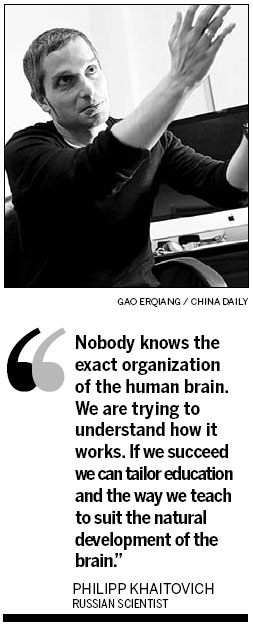Brain researchers off to head start in age-old quest
Updated: 2013-01-03 07:57
By Wang Ying in Shanghai (China Daily)
|
||||||||
|
Philipp Khaitovich leads a team of 25 researchers in the study of human brains at the Max Planck Society Partner Institute for Computational Biology. Provided to China Daily |
My China Dream | Philipp Khaitovich
Five large freezers are stored on the third floor of a building that houses the Shanghai Institute for Biological Sciences.
The freezers are set at -80 C, the correct temperature to protect their valuable contents: more than 1,000 brain samples from various species.
The owner of these samples is Russian scientist Philipp Khaitovich, who is leading a team of 25 researchers in Shanghai.
Khaitovich, 40, is group leader of the Max Planck Society Partner Institute for Computational Biology. His research group currently has two goals: To find out why humans are smarter than other species, and to better understand the aging process.
Education and the way we teach children is of particular interest.
"Nobody knows the exact organization of the human brain. We are trying to understand how it works. If we succeed we can tailor education and the way we teach to suit the natural development of the brain."
To find the basis for better learning, Khaitovich's research group studies the connections between neurons in the brain.
"The human baby, or baby chimpanzee, do not have connections when they are born. The connections are formed based on the environment," Khaitovich says.

To find the way these connections are formed in humans compared to chimpanzees could help us to make humans even smarter, he explains.
Khaitovich's group is also looking at genetically related species, like macaques, to study aging.
"We want to know the mechanism behind the different life spans among species: One species dies at about 35 years of age while other species can live to 100 years," Khaitovich says.
"So if we can find the mechanism that controls this we can make humans age slower. Although humans will still suffer from aging, it would only happen after they reached 200 years or more."
His team are devoted to him and recognize his expertise.
"Philipp has all the characteristics I have seen in any successful group leader," says Sam Linsen, a 31-year-old postdoctoral fellow, who has worked with Khaitovich for two years.
"Problems on the working floor may seem complicated, but when Philipp watches over your shoulder you hear a solution that you never thought of.
"I appreciate his willingness and readiness to put short-term benefits aside and invest in long-term goals."
"I have been working here for more than five years, and I would say Philipp is half-boss and half-friend," He Liu says. "He is vastly experienced and yet allows his students freedom."
The PhD student will graduate in 2013, and he hopes to stay in the research group after graduation.
Khaitovich received his PhD in biology science at the University of Illinois, and he worked at the Max Planck Institute for Evolutionary Anthropology in Germany as a researcher for seven years.
Khaitovich believes that the CAS-MPG Partner Institute for Computational Biology offers an excellent opportunity to do independent research and to start a new group.
"It is a challenge, and it is also good experience. I am lucky to have truly excellent people in my group. Without them, I will not be able to do anything."
His experience enabled him to collaborate with scientists and other institutes globally.
Khaitovich enjoys a modest life in Shanghai. He lives with his Chinese wife, also a scientist, and they are looking forward to a new member of the family.
"I think she is much smarter than me. But that does not mean our child will be smart. Because, as our research finds, smartness is not only due to genetics but also to education and the environment."
wang_ying@chinadaily.com.cn
(China Daily 01/03/2013 page5)

 In Photos: 7.0-magnitude quake hits Sichuan
In Photos: 7.0-magnitude quake hits Sichuan
 Li Na on Time cover, makes influential 100 list
Li Na on Time cover, makes influential 100 list
 FBI releases photos of 2 Boston bombings suspects
FBI releases photos of 2 Boston bombings suspects
 World's wackiest hairstyles
World's wackiest hairstyles
 Sandstorms strike Northwest China
Sandstorms strike Northwest China
 Never-seen photos of Madonna on display
Never-seen photos of Madonna on display
 H7N9 outbreak linked to waterfowl migration
H7N9 outbreak linked to waterfowl migration
 Dozens feared dead in Texas plant blast
Dozens feared dead in Texas plant blast
Most Viewed
Editor's Picks

|

|

|

|

|

|
Today's Top News
Live report: 7.0-magnitude quake hits Sichuan, heavy casualties feared
Boston suspect cornered on boat
Cross-talk artist helps to spread the word
'Green' awareness levels drop in Beijing
Palace Museum spruces up
First couple on Time's list of most influential
H7N9 flu transmission studied
Trading channels 'need to broaden'
US Weekly

|

|








